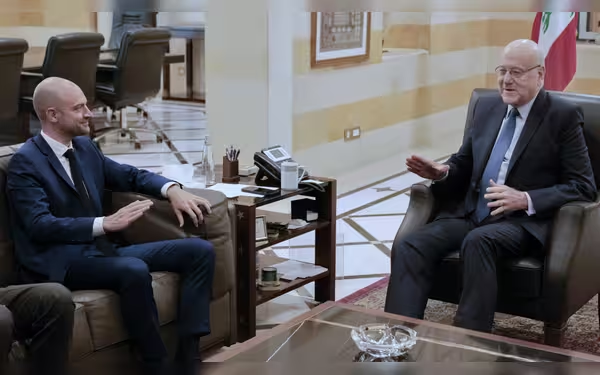Thursday, November 7, 2024 07:31 AM
Lebanon Prime Minister Urges Immediate Ceasefire with Israel
- Lebanon's PM calls for ceasefire amid escalating conflict.
- Humanitarian crisis deepens as casualties rise in Lebanon.
- International community urged to protect civilians in conflict.
 Image Credits: arabnewspk
Image Credits: arabnewspkLebanon's Prime Minister Najib Mikati calls for an immediate ceasefire with Israel amid escalating violence and humanitarian concerns.
In recent weeks, the conflict between Israel and Hezbollah has escalated dramatically, leading to significant humanitarian concerns in Lebanon. The situation has drawn international attention, prompting calls for a ceasefire to halt the violence that has resulted in numerous casualties and widespread destruction. Lebanon's Prime Minister Najib Mikati has taken a firm stance, advocating for an immediate ceasefire during a meeting with French Foreign Minister Jean-Noel Barrot in Beirut.
During their discussions, Mikati emphasized that the solution to the ongoing conflict lies in ending what he termed "Israeli aggression against Lebanon." He reiterated the importance of reviving the appeal made by the United States and France for a ceasefire, highlighting the urgent need to protect civilians caught in the crossfire. As tensions rise, Israel has been preparing for a potential ground incursion into Lebanon, further complicating the already dire situation.
Barrot, representing France, expressed solidarity with Lebanon, stating that his country is committed to safeguarding civilians and supporting the Lebanese army during these critical times. He announced the delivery of emergency humanitarian aid, including 12 tonnes of medical supplies, to address the urgent needs of those affected by the conflict. This aid is part of a broader effort, with the European Union also involved in providing relief to the Lebanese people.
In addition to the humanitarian crisis, the political landscape in Lebanon remains precarious. Barrot underscored the necessity of electing a president, which he described as a foundational priority for the country. The ongoing violence has made it increasingly difficult for Lebanon to stabilize its political situation, with many leaders calling for an end to hostilities.
Hezbollah, the Iran-backed militant group, has also been vocal in its response to the conflict. Following the assassination of its Secretary-General Hassan Nasrallah, Sheikh Naim Qassem, the group's deputy leader, assured supporters that Hezbollah would continue its resistance against Israel. He stated, "Despite losing several leaders, we will not budge an inch from our positions," emphasizing the group's commitment to defending Lebanon and supporting the Palestinian cause.
The violence has not only affected military leaders but has also resulted in tragic losses among civilians. Recent airstrikes have claimed numerous lives, including members of the Hamas leadership in Lebanon. The situation remains fluid, with ongoing attacks leading to further casualties and injuries among innocent civilians.
As the international community watches closely, the call for a ceasefire grows louder. The humanitarian crisis in Lebanon is dire, and the need for immediate action is critical. The situation serves as a stark reminder of the devastating impact of conflict on ordinary people, underscoring the importance of diplomatic efforts to restore peace and stability in the region. The hope remains that through dialogue and cooperation, a lasting resolution can be achieved, allowing the people of Lebanon to rebuild their lives and communities.













